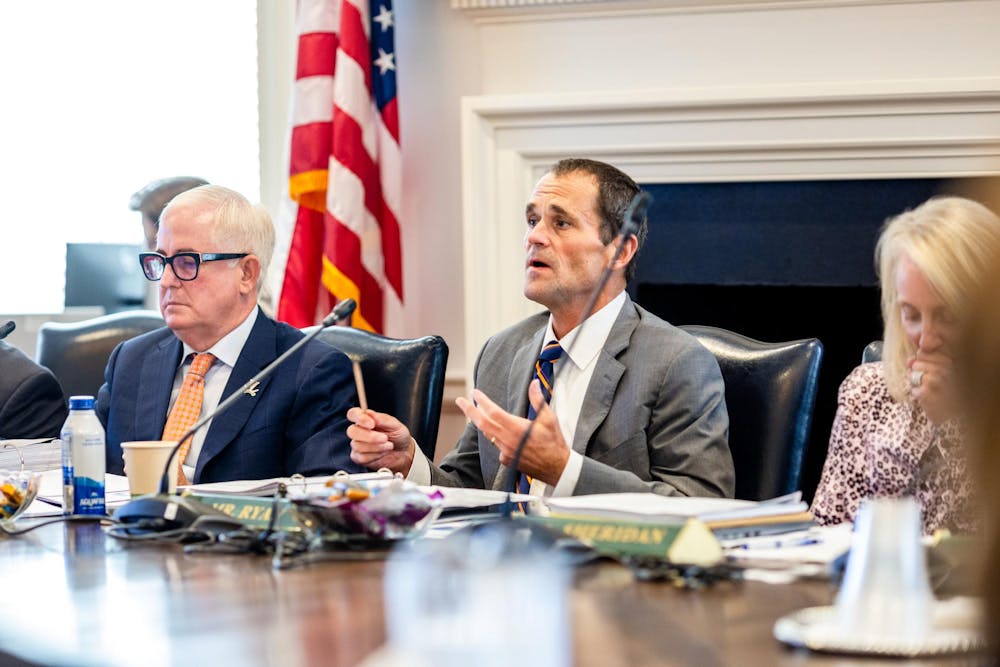The Full Board of Visitors unanimously voted Friday to accept an institutional policy drafted by the Committee on Institutional Statements recommending that the University refrain from commenting on social or political matters unless they directly affect its mission or operations. University President Jim Ryan also discussed plans for the 2024-2025 term, including securing funding for the Center for the Arts, a building that will serve as a rehearsal and performance space for students on Grounds, as well as making progress on the University’s Manning Institute for Biotechnology — a new center for University research in biotechnology.
Ryan voiced concerns at a Board meeting last December about the lack of protocol for University responses to social and political issues, calling for a uniform set of principles outlining when it will officially respond to global, social and political occurrences. He subsequently formed the Committee on Institutional Statements February to advise the University on when and how it should comment on national and global issues.
This initiative occurred during a period of tension in higher education following Hamas’ attacks on Israel Oct. 7, which Ryan condemned in a statement to the University community. Hundreds of students participated in a walkout protest for Palestine Oct. 25 demanding that the University condemn the “ongoing Genocide” and divest from the military technology used in the siege on Gaza. Controversies over official statements from universities have sparked backlash and precipitated the high profile resignations of Claudine Gay, former president of Harvard University and Liz Magill, former president of the University of Pennsylvania.
The Committee on Institutional Statements — led by University Professor of Politics John Owen — was tasked with developing a set of principles that can guide decisions on this topic. Ryan presented the committee’s document at the meeting, and said that the University should generally avoid taking political stances to protect academic freedom and free speech. According to Ryan, this approach stems from the Kalven Report — a report from the University of Chicago stating that universities should remain neutral on political issues.
The document states that if University leadership projects political opinions towards the student body, it can threaten academic freedom and open discourse.
“The extent to which institutional statements jeopardize academic freedom may vary according to circumstance, but the principle is straightforward: the University has leverage over its members and could chill dissent,” the document reads.
Ryan said that he agreed with the document’s conclusions, but that in some cases, it will be important to share sympathy following a tragic event and provide support for students. He said that there is a difference between sending a political message and providing support to the student body.
“Universities should be places where views can be challenged and differing viewpoints expressed without fear or favor,” Ryan said. “I don’t think there’s anything wrong with expressing sorrow … this is not about being silent in the face of something horrible that happens in the world.”
Porter N. Wilkinson, Board member and law school alumna, said that extending sympathies for one event but not another may be interpreted as taking sides on controversial issues and indirectly political. In response, President Ryan agreed with Wilkinson’s point, but said that the institutional policy is not a strict rule. He said that the policy addresses complicated issues and will involve judgment and discussion with University leadership in responding to crises.
“[The policy] is not a formula,” Ryan said. “We’ll have to proceed with caution.”
President Ryan also presented the University goals for the 2024-25 term, much of which surrounds long-term construction and development plans.
The University is currently undertaking several construction and development projects. Ryan said that the Manning Institute of Biotechnology — a 350,000 square foot building that supports biomedical research — is one of the most significant. The University launched the initiative following a $100 million donation from philanthropists Paul and Diane Manning, and will focus on medical research like cellular therapy, gene therapy, nanotechnology and drug delivery. The building will be located near Fontaine Research Park — a series of buildings which house University research clinics and labs — and also include a café and conference center.
Ryan said that the University is in the process of finding an executive director to lead the Manning Institute, with the search expected to be completed in one to two months.
“[The executive director] is absolutely a critical position, given the investment that all of us are making in that institute,” Ryan said. “There’s a lot riding on it.”
The Board also discussed securing funding for the Center for Arts, a project designed to expand rehearsal and performance spaces on Grounds. The Center will be located in the Ivy Corridor — a 14.5-acre University-owned parcel at the intersection of Emmet Street and Ivy Road, adjacent to the recently opened School of Data Science. President Ryan said that the estimated cost of the project is at least $100 million, and that the University has secured $60 million so far.
“We will only be able to move forward on this project if and when we get funding from the state,” Ryan said.
Friday’s agenda also outlined recent grants and donations acquired from July 2023 to June 2024, with fundraising amounting to $617,991,567. According to the agenda, many departments received an increase in funding compared to the previous fiscal year, examples being The Darden School of Business, Athletics, School of Law, McIntire School of Commerce and University Libraries.
Another item on the agenda was the University’s certification for the Atlantic Coast Conference membership — a requirement fulfilled annually to maintain participation in the East Coast collegiate athletic conference — which the Full Board signed.
The next meeting of the Board of Visitors is scheduled for December.







